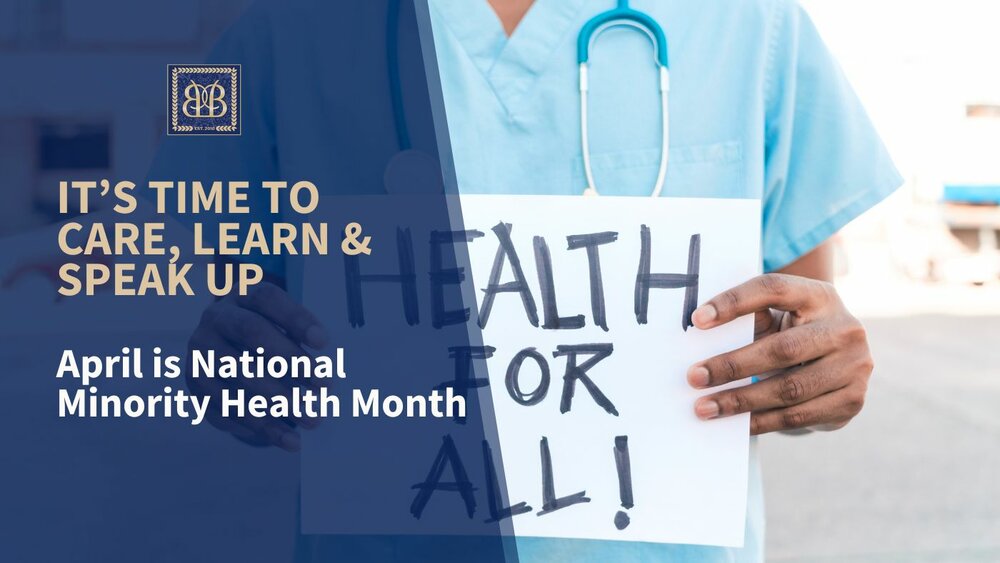It’s Time to Care, Learn and Speak Up: April is National Minority Health Month
National Minority Health Month reminds us that health care should be equal and accessible for all.
Every April, we recognize National Minority Health Month (NMHM), a time to shine a light on the health challenges that many racial and ethnic communities still face in the U.S. It’s not just about raising awareness—it’s about taking action to make health care accessible for everyone. Read on for some revealing and important facts about health disparities, along with information designed to inspire and encourage action.
How did NMHM start?
National Minority Health Month has been around in some form for over 100 years. It began as National Negro Health Week, created by educator and leader Booker T. Washington. He saw that poor health held people back and believed that better living conditions, sanitation, and health care were essential for African American communities to move forward. Since then, this effort has grown into a nationwide push to close the health gaps affecting Black, Hispanic, Asian, Native American, Pacific Islander, and other underserved groups.
What are health disparities?
Health disparities are unfair differences in how people get care or how their health is affected by things like race, income, where they live, or how much support they have. Some communities have a harder time getting medical services, dealing with chronic conditions, or even affording basic care. These gaps are often caused by bigger issues like poverty, discrimination, lack of access to healthy food or clean air, or not having health insurance. And these challenges don’t affect everyone equally.
Here’s a closer look at how different communities are impacted:
African American
- Despite medical advancements, Black Americans still face disproportionately high rates of chronic illnesses such as diabetes, heart disease, and hypertension.
- Maternal mortality rates among Black women are more than double that of White women, and Black infants are more than twice as likely to die before their first birthday.
- These disparities reflect not just differences in care, but inequalities rooted in decades of neglect, racism, and economic exclusion.
Hispanic/Latino
- Latino communities often encounter barriers like lack of insurance coverage, language obstacles, and limited access to culturally responsive care.
- While some Latino populations have positive health outcomes, challenges persist, particularly in rural areas and among migrant workers.
- COVID-19 shed light on these vulnerabilities, with many Latino families experiencing higher infection rates and reduced access to vaccination and treatment resources.
Asian American
- Asian American communities are diverse, but important health issues are often overlooked because data is grouped together and doesn’t reflect individual subgroups.
- Some groups, like Southeast Asians and Pacific Islanders, face higher rates of liver cancer, diabetes, and mental health challenges.
- Stigma and lack of culturally tailored care make it harder for many people to get the support they need.
Native American and Alaska Native Communities
- American Indian and Alaska Native populations have some of the highest rates of diabetes, substance use disorders, and mental health challenges.
- Access to quality care is limited in many tribal areas, and life expectancy remains significantly lower than the national average.
- Historic underfunding of tribal health services continues to undermine community well-being.
Native Hawaiian and Pacific Islander
- These communities often face disproportionately high rates of obesity, cardiovascular disease, and diabetes.
- Despite this fact, they are often overlooked in national health discussions due to data being lumped in with larger Asian groups.
- Lack of data and limited access to healthcare services contributes to poorer health outcomes.
The need for vigilance is great.
In recent years, significant progress has been made through health equity initiatives, expanded coverage under the Affordable Care Act, and a broader understanding of the social determinants of health. But in 2025, there’s growing concern that these hard-won gains may be threatened.
Current shifts in politics have created uncertainty over the future of programs that prioritize underserved communities. There’s a noticeable pivot away from policies focused on equity and access, making it even more important for community members, advocates, and organizations to remain engaged and vocal.
How can you be part of the movement?
Everyone has a role to play in closing the health gap. Here’s how you can get involved during National Minority Health Month:
- Start with yourself: Adopt one new healthy habit, whether it’s to walk more, drink more water, or eat more fruits and vegetables. Your wellness journey inspires others.
- Get your community moving: Organize a local walk, fitness class, or health fair. Movement is medicine and it’s even more powerful when done together.
- Educate and advocate: Learn more about the health challenges your community faces. Attend local forums or support organizations doing the work.
- Speak up for equity: Whether it’s through voting, volunteering, or simply starting a conversation, your voice matters in pushing for fair health policies.
This National Minority Health Month, let’s make a collective effort to eliminate health disparities. Together, we can achieve health equity and ensure that everyone has the opportunity for a healthier tomorrow.
Education is key when it comes to understanding and addressing health disparities. Batchelor Brothers Funeral Services is proud to offer an array of helpful resources and valuable information. If you have questions or if we can be of assistance in any way, please reach out to us.
About Batchelor Brothers Funeral Services: As a leading African American-owned and operated funeral and cremation organization, Batchelor Brothers Funeral Services has provided a ministry of care to thousands of grieving families. We promise to provide our highest level of distinguished service and respect to families who entrust us to honor their loved ones. With two convenient locations serving North and West Philadelphia, it is always our pleasure to be of service. For more information about our funeral, cremation, memorial, repast, and grief counseling services, please visit batchelorbrothers.com.







Comments